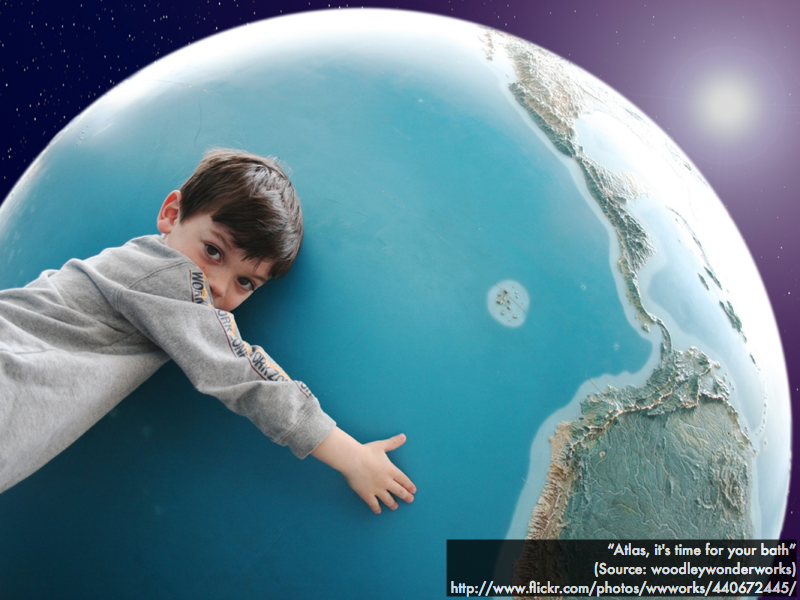Cuesta College, San Luis Obispo, CA
Students have a weekly online reading assignment (hosted by SurveyMonkey.com), where they answer questions based on reading their textbook, material covered in previous lectures, opinion questions, and/or asking (anonymous) questions or making (anonymous) comments. Full credit is given for completing the online reading assignment before next week's lecture, regardless if whether their answers are correct/incorrect. Selected results/questions/comments are addressed by the instructor at the start of the following lecture.
The following questions were asked on reading textbook chapters and previewing presentations on problems caused by the atmosphere for telescope observing, Earth, and the impacted worlds: the moon, and Mercury.
 Selected/edited responses are given below.
Selected/edited responses are given below.Describe something you found interesting from the assigned textbook reading or presentation preview, and explain why this was personally interesting for you.
"That air can distort one's view like water. I had no idea why the stars appeared to twinkle. This explains my favorite song, 'Twinkle, Twinkle, Little Star.'"
"How much light pollution effects how much of the night sky we are able to see, including the moon."
"The large impact hypothesis. Sadly, I never considered where the moon came from in all my years."
"How Earth and some other planet crashed into each other and created the moon. what a sight that would be to see."
"This is all new to me."
Describe something you found confusing from the assigned textbook reading or presentation preview, and explain why this was personally confusing for you.
"the resolving and magnifying powers of a telescope is still a little fuzzy for me."
"How the stars twinkle."
"Why continental drift happens, and how the tectonic plates move."
"
"I found it confusing the fact that most of our carbon dioxide comes from volcanoes."
"The carbon cycle but we will probably go over it more in class."
"I have never really grasped the greenhouse effect. I would like a more in-depth explanation."
"I don't understand how you can tell the oldest from the youngest features on the moon and Mercury. I couldn't tell from the images and could find no additional information."
"Nothing really."
"A lot of it. "
Stars to appear to "twinkle" in the night sky because of...
"The gases in them."
"Things cross paths with the light coming to Earth."
"The stars appear to twinkle in the sky because of atmospheric turbulence. We are on the bottom of a sea of air, so disturbances or turbulence can cause distortion."
A large modern optical telescope in outer space would have images with better __________ than a comparable ground-based telescope.
brightness. ********* [9] resolution. ************************ [24] magnification. [1] (None of the above choices.) [0] (Two of the above choices.) ***** [5] (All of the above choices.) ********* [9] (Unsure/guessing/lost/help!) * [1]
Identify how carbon dioxide enters and how it is taken out of Earth's atmosphere.
(Only correct responses shown.)
Enters atmosphere from: volcanoes [50%]
Taken out of atmosphere by: oceans [60%]
Identify the oldest (longest ago) to the youngest (most recent) features on the moon.
(Only correct responses shown.)
Craters partially filled in with flat lava plains: oldest (formed longest ago) [52%]
Flat lava plains: middle [29%]
Craters on top of flat lava plains: youngest (formed most recently) [52%]
Identify the oldest (longest ago) to the youngest (most recent) features on Mercury.
(Only correct responses shown.)
Large crater basins: oldest (formed longest ago) [35%]
Lava-filled lowlands: middle [48%]
Long curving ridges: youngest (formed most recently) [60%]
Ask the instructor an anonymous question, or make a comment. Selected questions/comments may be discussed in class.
"I thought the huge telescope we used last class was so fun! Looking at the moon with our own eyes and all the detail it displayed was so interesting! Thanks for letting us do that! "
"By relocating telescopes away from urban areas the problem of light pollution can be solved. This confuses me because even after the telescope is away from the urban areas I don't see how the atmosphere turbulence problem would be solved." (Adaptive optics is a new method used to nearly remove all of the 'twinkling' effect of turbulence in Earth's atmosphere.)
"I had trouble with understanding a good amount of this material--I plan to go through the book again but can we review a good amount in class? Will there be any review days before the midterms and finals?" (Yes, we will have some in-class review time for the upcoming midterm. In the meanwhile, there will be some new material on the third quiz, but it will also include some questions from the first two quizzes as well.)
"Do the exam questions come from the quiz questions or are they different?" (All of the multiple-choice questions on the midterms and the final are adapted from this semester's quiz questions. There will also be short-answer essay questions on selected topics, and we will specifically review those concepts in class.)


No comments:
Post a Comment